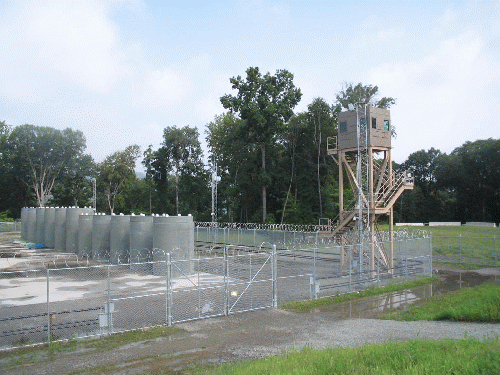Given that 2,000 tons of spent nuclear fuel is produced every year at nuclear reactors in the United States, and over 75,000 metric tons of nuclear waste is being temporarily stored in 39 states, it is surprising that the Nuclear Regulatory Commission (NRC) has emphatically said this amount of waste is safe. What's even more surprising is that no one has disputed them. Until now.
[dry casks at Indian Point Nuclear Power Plant. Abby Luby photo]
Last week, in what New York State calls a landmark victory, a U.S. Appeals Court ruled that the NRC violated a federal act by neglecting to run in-depth studies on how storing radioactive waste at nuclear power plants impacts health and the environment. The lawsuit was spearheaded and won by New York Attorney General Eric Schneiderman, who was joined by state attorneys general from Connecticut, Vermont and New Jersey, and the Prairie Island Indian Community.
Schneiderman and his boss, Governor Andrew Cuomo, in their aggressive pursuit to shutter the aging Indian Point Nuclear Power plant in Westchester, have chased after many pro-nuclear policies that seem to drive the NRC. In 2007, Entergy, Indian Point's owner, applied to re-license the plant's twin reactors to run for 20 more years. Three years later, the NRC amended their "Waste Confidence Decision," allowing plants to store more waste on-site without site-specific environmental or safety reviews. The NRC held that waste storage was safe for at least 60 years after a plant shuts down; they then proposed a rule to allow spent fuel storage at reactor sites for 200-300 years.
Of the record-breaking number of contentions opposing Entergy's license renewal application, many focus on the dangers of storing spent fuel. The NRC has discounted those contentions, claiming waste safety issues as part of the agency's regular oversight routine. But the court has ruled otherwise, siding with Schneiderman, who charged the NRC violated the National Environmental Policy Act (NEPA), a law requiring agencies to study environmental impacts of new actions and decisions that involve the re-licensing of power plants. How the ruling affects Indian Point's license renewal application remains to be seen.
Currently at Indian Point, 1,500 tons of high-level irradiated waste is stored in heavy steel and concrete casks on a tarmac a few hundred feet from the Hudson River. The Westchester-based plant produces about 30 tons of radioactive waste every 18 months, which is then crammed into two overcrowded, 40-foot deep spent fuel pools. Each pool holds about 1,000 tons of radioactive waste and has been leaking into the ground and river for years. However, the NRC has maintained that whatever leaches into the river is negligible, reiterating their catch phrase: "Dilution is the solution to pollution."
A national repository at Nevada's Yucca Mountain was chosen by Congress in 1987. But, the decision was overturned, and, eventually, the Obama Administration cut off funds, giving utility owners no choice but to store the waste on-site at their plants.
Last year, the nuclear disaster at Japan's Fukushima power plants saw massive amounts of radiation released into the environment from fires and uncontained radioactive waste pouring from spent fuel pools, forcing widespread evacuation. In a study by the Institute for Policy Studies, "Spent Nuclear Fuel Pools in the U.S.: Reducing the Deadly Risks of Storage," Robert Alvarez, author and senior scholar for nuclear policy, said that Indian Point has three times the radioactivity of Fukushima's spent fuel pools.
Indian Point is about 30 miles from Manhattan. A 1997 analysis, the Brookhaven National Laboratory [ http://pbadupws.nrc.gov/docs/ML0230/ML023040470.pdf - page 4] estimated a severe fire in a spent-fuel pool would release enough radioactive material to cause as many as 28,000 cancer deaths in a densely populated area and render 188 square miles uninhabitable.
In light of the Fukushima disaster and the potential for future leakage and catastrophic fires, the court ruled that the NRC's analysis of the impacts of spent fuel storage was insufficient and is now requiring the agency to reassess the environmental impacts of the waste storage. Now it's up to the NRC to heed the court and truly "protect the health and safety of the public."







